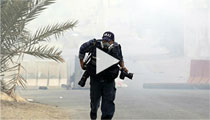Journalists faced numerous attacks during a tumultuous year marked by the ouster of President Mohamed Nasheed, the country’s first democratically elected leader. Nasheed opponents attacked TV stations and journalists in the capital, Malé, after protests against his government escalated in early year. Nasheed, a former human rights defender and political prisoner who was elected president in 2008, stepped down in February but accused his successor, Mohammed Waheed Hassan, and former dictator Maumoon Abdul Gayoom of having orchestrated a coup. As Nasheed’s supporters took to the streets in protests seeking new presidential elections, numerous attacks on the press were reported. News coverage reflected the country’s political polarization. Raajje TV, a pro-Nasheed station, said that vandals briefly forced it off the air and that police assaulted and harassed its journalists. Police accused Raajje of falsely reporting officer misconduct and said vaguely that they would not “provide support” to the station. New elections were slated for July 2013, but tensions remained high in late year after Nasheed was arrested on abuse-of-office charges. The worst attack of the year came in June when unidentified assailants slashed the throat of Ismail Rasheed, a secularist who blogged about gay rights. His supporters said Hassan had stoked religious extremism and failed to ensure a proper investigation into the attack on Rasheed, who survived.
Maldives
» In a polarized and tumultuous climate, numerous journalists are attacked.
» Blogger is stabbed after writing about religious freedom and gay rights.
Journalists faced numerous attacks during a tumultuous year marked by the ouster of President Mohamed Nasheed, the country’s first democratically elected leader. Nasheed opponents attacked TV stations and journalists in the capital, Malé, after protests against his government escalated in early year. Nasheed, a former human rights defender and political prisoner who was elected president in 2008, stepped down in February but accused his successor, Mohammed Waheed Hassan, and former dictator Maumoon Abdul Gayoom of having orchestrated a coup. As Nasheed’s supporters took to the streets in protests seeking new presidential elections, numerous attacks on the press were reported. News coverage reflected the country’s political polarization. Raajje TV, a pro-Nasheed station, said that vandals briefly forced it off the air and that police assaulted and harassed its journalists. Police accused Raajje of falsely reporting officer misconduct and said vaguely that they would not “provide support” to the station. New elections were slated for July 2013, but tensions remained high in late year after Nasheed was arrested on abuse-of-office charges. The worst attack of the year came in June when unidentified assailants slashed the throat of Ismail Rasheed, a secularist who blogged about gay rights. His supporters said Hassan had stoked religious extremism and failed to ensure a proper investigation into the attack on Rasheed, who survived.
Anti-Nasheed protesters took over a state-run TV outlet of the Maldives National Broadcasting Commission and set fire to the privately owned station VTV amid February protests.
May 2011: | Hundreds of protesters gather in the capital over rising food prices, news reports say. |
December 23, 2011: | Religious-oriented protests are held for and against Nasheed’s model of moderate Islam. |
January 16, 2012: | Nasheed orders the arrest of Chief Justice Abdulla Mohamed, saying the judge had obstructed criminal investigations into allies of former leader Gayoom, prompting protests, news reports said. |
February 6: | About 50 police officers decline to follow orders and join anti-Nasheed protests, which escalate into violence. |
February 7: | Nasheed resigns, but says the move was under duress. |
In June, three unidentified men stabbed Ismail Rasheed after the blogger, known by his penname Hilath, wrote about freedom of religion and gay rights, according to the Maldives Journalist Association and local news website Minivan News. He survived and fled the country; the attack is unsolved.
July 2009: | Hilath receives death threats after writing an article about an underage girl being kept as a concubine, according to Minivan News. |
November 2011: | The Ministry of Islamic Affairs orders Hilath’s website shut down for content perceived as anti-Islamic, according to Minivan News. |
December 2011: | Hilath is attacked and hospitalized after organizing a silent protest in favor of religious tolerance. Police detain him for 24 days while assailants go unpunished, according to local news reports. |
June 2012: | Six assailants threaten to kill Hilath, according to independent news website Minivan News. Days later, Hilath is stabbed and seriously injured. |
Unidentified men break into and vandalize Raajje TV offices on August 7, shutting down the broadcaster for a day. The attack, which caused thousands in damages, came amid a standoff between the broadcaster and police over allegations that Raajje was inciting political violence.
July 13, 2012: | Raaje TV journalists report surveillance and harassment by police, forcing them to cut live broadcasts of protests in the capital, Malé. |
July 23: | Raaje TV broadcasts footage purportedly showing police officers stealing gas; police say the video was misleading. |
July 24: | The Maldives Police Service announces it will ”disengage cooperation“ with Raaje TV. Home Minister Mohamed Jameel characterizes the outlet as an enemy of the state, according to Minivan News. |
October 2: | Police withdraw their boycott of Raaje TV, the Maldives Journalist Association says. |
Penetration has more than doubled since 2007, according to figures from the International Telecommunication Union.

